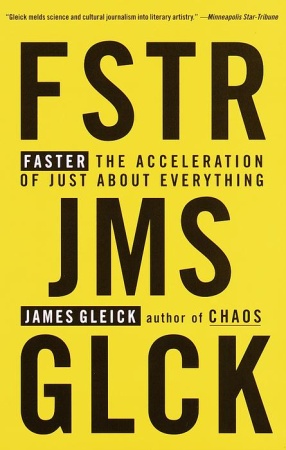James Gleick: Faster: The Acceleration of Just About Everything (1999)
Filed under book | Tags: · clock, multitasking, speed, television, time

From the bestselling, National Book Award-nominated auhtor of Genius and Chaos, a bracing new work about the accelerating pace of change in today’s world.
Most of us suffer some degree of “hurry sickness.” a malady that has launched us into the “epoch of the nanosecond,” a need-everything-yesterday sphere dominated by cell phones, computers, faxes, and remote controls. Yet for all the hours, minutes, and even seconds being saved, we’re still filling our days to the point that we have no time for such basic human activities as eating, sex, and relating to our families. Written with fresh insight and thorough research, Faster is a wise and witty look at a harried world not likely to slow down anytime.
Publisher Pantheon Books, 1999
ISBN 0679408371, 9780679408376
Length 324 pages
PDF (PDF’d HTML)
PDF (PDF’d HTML)
Naomi S. Baron: Always On: Language in an Online and Mobile World (2008)
Filed under book | Tags: · blogging, electronic communication, facebook, instant messaging, internet, language, listening, mobile technology, multitasking, reading, writing

In Always On , Naomi S. Baron reveals that online and mobile technologies–including instant messaging, cell phones, multitasking, Facebook, blogs, and wikis–are profoundly influencing how we read and write, speak and listen, but not in the ways we might suppose. Baron draws on a decade of research to provide an eye-opening look at language in an online and mobile world. She reveals for instance that email, IM, and text messaging have had surprisingly little impact on student writing. Electronic media has magnified the laid-back “whatever” attitude toward formal writing that young people everywhere have embraced, but it is not a cause of it. A more troubling trend, according to Baron, is the myriad ways in which we block incoming IMs, camouflage ourselves on Facebook, and use ring tones or caller ID to screen incoming calls on our mobile phones. Our ability to decide who to talk to, she argues, is likely to be among the most lasting influences that information technology has upon the ways we communicate with one another. Moreover, as more and more people are “always on” one technology or another–whether communicating, working, or just surfing the web or playing games–we have to ask what kind of people we are becoming, as individuals and as family members or friends, if the relationships we form must increasingly compete for our attention with digital media.
* The first book to survey the field of electronically-mediated communication, position these technologies with respect to earlier language practices, and then evaluate the personal, cognitive, social, and linguistic consequences of contemporary language technologies.
* Analyzes of instant messaging conversations, multitasking, away messages, Facebook, and mobile phone usage by American college students draw upon original research by the author and her colleagues.
Publisher Oxford University Press US, 2008
ISBN 0195313054, 9780195313055
289 pages
PDF (updated on 2013-2-6)
Comment (0)
